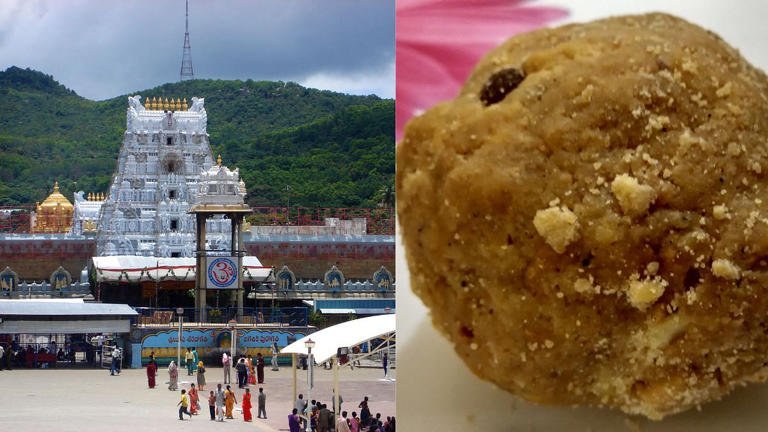The Tirumala Tirupati Laddu Controversy: Faith, Food, and Political Maneuvering
Temple and Laddu in question
The Tirumala Tirupati laddu is more than a sweet offering; it is a symbol of deep devotion for millions of Hindu devotees who visit the temple of Lord Venkateswara in Andhra Pradesh. However, recent controversies surrounding its preparation have ignited both religious and political debates. Allegations of impurities in the prasadam, particularly the claim that animal fat was used in the ghee, have not only shaken the faith of devotees but also sparked a political row. This issue, which intertwines questions of faith, purity, and power, offers a revealing look into how religious practices can become battlegrounds for political maneuvering.
Tradition and Purity: Theological Stakes
From a theological perspective, the sanctity of the Tirupati laddu is non-negotiable. As noted by spiritual leaders like Acharya Prashant, the laddu is not merely food but a divine prasadam, imbued with the blessings of the deity. The preparation and distribution of this offering follow strict religious protocols, designed to ensure both its spiritual purity and its connection to the divine. When allegations surfaced about the use of animal fat in the ghee used for making the laddus, it created a profound sense of betrayal among devotees. This breach of trust, as Acharya Prashant argues, goes beyond logistics; it strikes at the heart of the sacred relationship between worshipers and their faith.
Devotees line up
In response to these concerns, the Tirumala Tirupati Devasthanams (TTD) quickly appointed Karnataka’s Nandini as the exclusive supplier of ghee, attempting to restore confidence in the purity of the prasadam. However, the theological concerns around food purity remain paramount. In Hinduism, where food is often seen as a reflection of one's spiritual cleanliness, any deviation from established norms—particularly in offerings to deities—is considered a serious violation.
The Political Row: Naidu’s Allegation and Its Fallout
The controversy took on a more complex dimension when N. Chandrababu Naidu, leader of the Telugu Desam Party (TDP), publicly alleged that animal fat had been used in the preparation of the laddus. Naidu’s accusation quickly set off a political firestorm, with the ruling Yuvajana Sramika Rythu Congress Party (YSRCP) denying the allegations and accusing Naidu of using religious sentiments for political gain. The YSRCP, led by Chief Minister Y.S. Jagan Mohan Reddy, defended the purity of the prasadam and dismissed the claims as politically motivated attacks intended to destabilize the government.
Naidu’s remarks come in a political climate where religious symbols are frequently deployed as tools for political advantage. In Andhra Pradesh, where the Tirumala temple holds immense cultural and political significance, any controversy involving the temple has far-reaching implications. By raising concerns about the purity of the laddu, Naidu has tapped into a potent mix of religious sentiment and public trust, aiming to cast doubt on the ruling party’s management of one of the most important religious institutions in the state.
Politics, Purity, and Control Over Religious Practices
The political row surrounding the laddu highlights a broader pattern in Indian politics: the use of religious practices and symbols to influence public opinion. Naidu’s allegations, whether true or not, serve as a reminder of how religious traditions can be co-opted for political gain. In this case, the dispute over the laddu's purity is not just about theology—it is about who gets to control the narrative around religious practices and how that control can be leveraged for political advantage.
The YSRCP’s quick denial and their decision to appoint Nandini as the exclusive supplier of ghee are part of a larger effort to demonstrate their commitment to maintaining the sanctity of the Tirumala temple. However, the fact that such a controversy has erupted at all shows how fragile the balance is between religious tradition and political interests. As Acharya Prashant notes, any breach of trust in religious offerings is a profound moral and spiritual issue. But in the current political climate, it is also an opportunity for parties to gain an upper hand by aligning themselves with the guardians of religious purity.
Balancing Faith and Political Gamesmanship
The Tirumala Tirupati laddu controversy has laid bare the intricate relationship between faith, food, and politics in India. While the theological concerns about food purity are genuine and must be respected, the political row that has erupted shows how religious practices can be weaponized for political advantage. Naidu’s allegations of animal fat in the laddu, while unsubstantiated, have forced the ruling YSRCP to go on the defensive, highlighting the delicate balance between maintaining tradition and navigating political rivalries.
In the end, this controversy is not just about whether the laddus remain pure—it is about how religious practices are governed and who has the power to control them. In a landscape where food purity, religious faith, and politics intersect, the Tirupati laddu has become a symbol of more than just devotion; it is a reflection of the broader struggles over faith, power, and governance in modern India.
As the controversy unfolds, it is essential to remain clear-eyed about the forces at play. The sanctity of religious practices must be upheld, but the political gamesmanship surrounding them cannot be ignored. Acharya Prashant’s theological perspective serves as a timely reminder: when faith is politicized, the trust between devotees and their spiritual practices is at risk, and that breach may have long-lasting consequences for both religion and politics in India.


